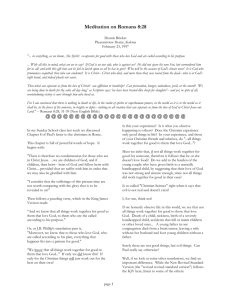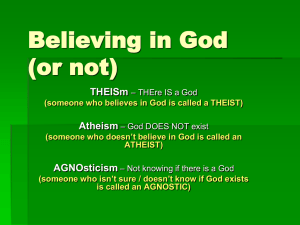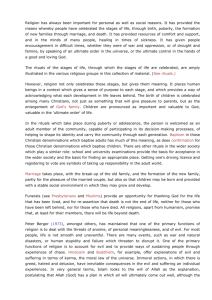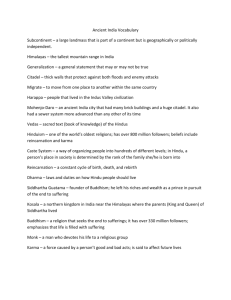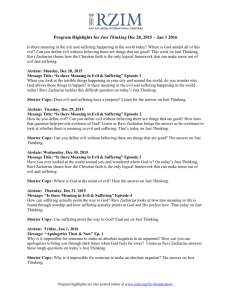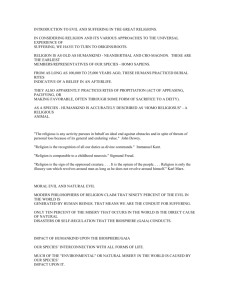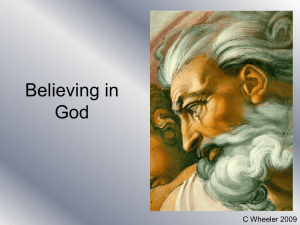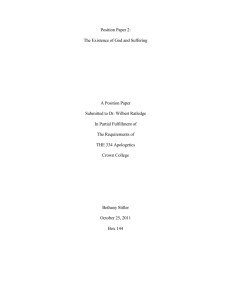Questions at the Workplace – Part 2 Why is there suffering and evil
advertisement
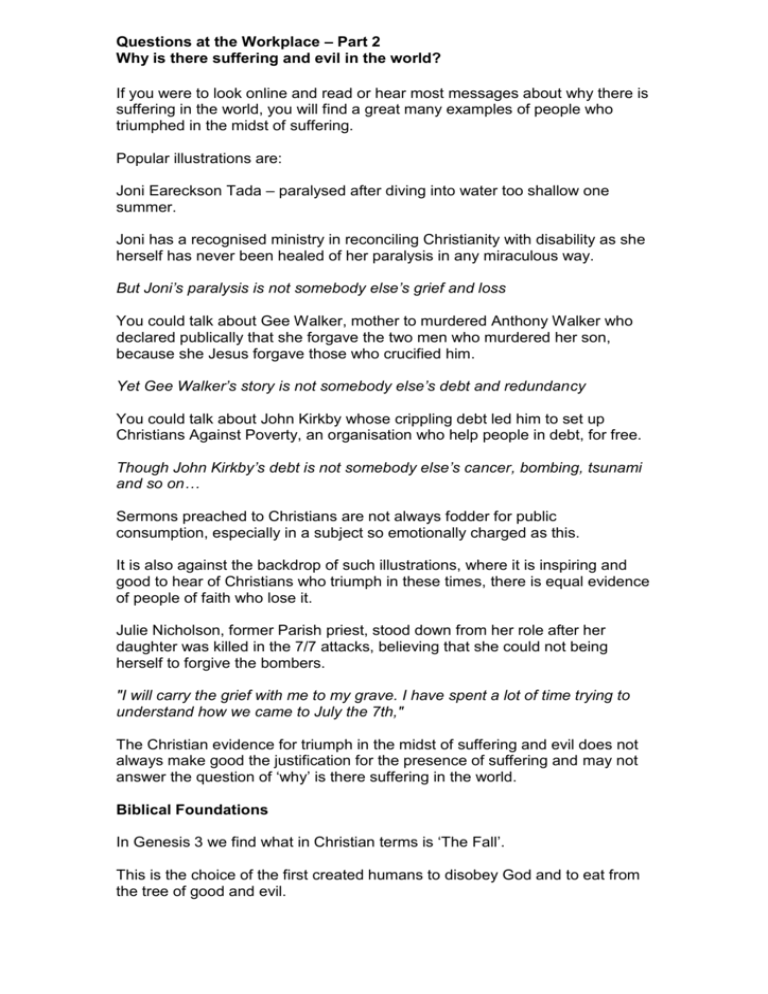
Questions at the Workplace – Part 2 Why is there suffering and evil in the world? If you were to look online and read or hear most messages about why there is suffering in the world, you will find a great many examples of people who triumphed in the midst of suffering. Popular illustrations are: Joni Eareckson Tada – paralysed after diving into water too shallow one summer. Joni has a recognised ministry in reconciling Christianity with disability as she herself has never been healed of her paralysis in any miraculous way. But Joni’s paralysis is not somebody else’s grief and loss You could talk about Gee Walker, mother to murdered Anthony Walker who declared publically that she forgave the two men who murdered her son, because she Jesus forgave those who crucified him. Yet Gee Walker’s story is not somebody else’s debt and redundancy You could talk about John Kirkby whose crippling debt led him to set up Christians Against Poverty, an organisation who help people in debt, for free. Though John Kirkby’s debt is not somebody else’s cancer, bombing, tsunami and so on… Sermons preached to Christians are not always fodder for public consumption, especially in a subject so emotionally charged as this. It is also against the backdrop of such illustrations, where it is inspiring and good to hear of Christians who triumph in these times, there is equal evidence of people of faith who lose it. Julie Nicholson, former Parish priest, stood down from her role after her daughter was killed in the 7/7 attacks, believing that she could not being herself to forgive the bombers. "I will carry the grief with me to my grave. I have spent a lot of time trying to understand how we came to July the 7th," The Christian evidence for triumph in the midst of suffering and evil does not always make good the justification for the presence of suffering and may not answer the question of ‘why’ is there suffering in the world. Biblical Foundations In Genesis 3 we find what in Christian terms is ‘The Fall’. This is the choice of the first created humans to disobey God and to eat from the tree of good and evil. Questions at the Workplace – Part 2 Why is there suffering and evil in the world? In which case we come to what is also referred to as the doctrine of original sin. In a basic explanation it describes two things: 1) The first sin that man committed 2) The consequences of that sin: a) A change in our relationship with God (barrier of shame) b) A change in creation (pain, cursed ground, toil for our provision) c) All humans are born into this separated and changed state (Spiritual DNA) So actually, the question of ‘Why’ is not too difficult to explain from the Christian point of view. Some Christians would argue against the doctrine of original sin but as G K Chesterton noted, “Certain new theologians dispute original sin, which is the only part of Christian theology which can really be proved,” He saw original sin as the one Christian doctrine that is empirically verifiable and validated by 3500 years of human history, a world in disorder. If not why, then how, can God let it happen? We come to the next stage of the question which gets a little trickier but is still answerable in academic or philosophical terms. This is the point at which free will comes into our conversation. Some may argue that ‘Free Will’ is not actually in the Bible. Though it is there simply from assessing the world which God had created. Free will is determined by choice, a choice to comply with an instruction or to not comply with an instruction. Without the restricted tree in the Garden of Eden man would not have been intrinsically free, for there would have been no choice. It is thus we come to man’s most common answer for eradicating evil in the world, kill them all! It’s funny, but Hitler said the same thing! Joe South recorded the hit song in 1974, Walk a Mile in my shoes. The line of the chorus in this song goes, “before you accuse, criticise and abuse, walk a mile in my shoes.” Questions at the Workplace – Part 2 Why is there suffering and evil in the world? So for many their belief that God should sort out the evil and suffering in the world is a belief without having though through just God could do. Asking people how they think God could sort it out, without marshal law, without taking away freedom, is a good challenge. The Solution God’s John 3:16 is a naturally popular text. Though Christians don’t often talk about the future of what’s to come, we have and should speak of our eternal hope. The Apostle Paul speaks about creation groaning in eager expectation of renewal. It likens the natural violence of the earth to birth pangs. (Romans 8:19) The promise of following Jesus is that we get to inherit the new heaven and earth, to be part of a newly made creation and to begin afresh what was intended in the first place. Ours The second challenge comes to be Christian and especially the non Christian who asks the question in the first place, what can we do to help see suffering cease? Proof of God? Some will ask the question: if God exists, why is there evil and suffering in the world? It could be argued, that if God doesn’t exist, to what extent will evil go and how will it ever be eradicated? Secondly, where we look to deny God’s existence because of evil, we should point out that evidence for God can be found in the vast good that exists in the world. It is at this point that our real life stories of faith, ours first but famous ones also, come into the conversation. Pastoral Care As we’ve talked before, many people have underlying circumstances and motivations for asking these questions. Questions at the Workplace – Part 2 Why is there suffering and evil in the world? We must be careful to look behind the question first before evangelically sharing our views, convictions and opinions. Most often, people ask this question in both personal and national times of tragedy. In these times the question back may be, “tell me your story, how have you come to ask this question?” We should look to care for the person first and answer their question second.
